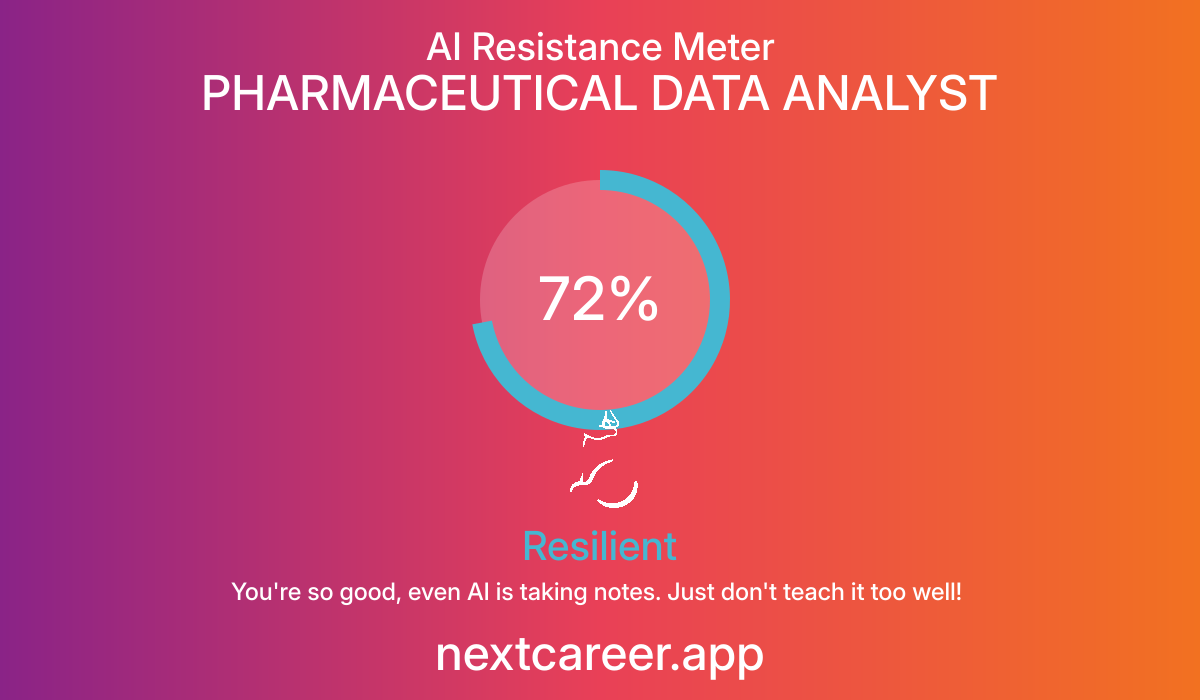AI Resistance Analysis
PHARMACEUTICAL DATA ANALYST
PHARMACEUTICAL DATA ANALYST
AI Resistance Score
AI Resistance Meter
Resilient
PHARMACEUTICAL DATA ANALYST
You're so good, even AI is taking notes. Just don't teach it too well!
The role of a Pharmaceutical Data Analyst exhibits a significant level of AI resistance in both the near-term and long-term landscapes. This score is primarily due to the combination of analytical cognitive tasks, the necessity of emotional intelligence for interdisciplinary collaboration, and ethical considerations in healthcare data interpretation. While AI can assist with data processing and pattern recognition, the human element in contextualizing findings in a rapidly changing healthcare environment remains critical.
The role of a Pharmaceutical Data Analyst exhibits a significant level of AI resistance in both the near-term and long-term landscapes. This score is primarily due to the combination of analytical cognitive tasks, the necessity of emotional intelligence for interdisciplinary collaboration, and ethical considerations in healthcare data interpretation. While AI can assist with data processing and pattern recognition, the human element in contextualizing findings in a rapidly changing healthcare environment remains critical.
Key Factors
- Cognitive Tasks: While AI can handle vast datasets and perform complex analytics effectively, the ability to interpret results and assess their implications in a real-world context is still predominantly a human skill.
- Emotional Intelligence: The role often requires collaboration with clinical teams and understanding stakeholder needs, where emotional intelligence is paramount to effectively communicate complex data insights.
- Physical Skills: The role is primarily analytical, requiring minimal physical skills, thus AI has limited impact in this area.
- Creative Thinking: Creativity is needed in developing innovative solutions to data challenges and improving analytical methods, a domain where AI still lacks human-level ingenuity.
Human Advantages
- Ability to contextualize data findings within nuanced healthcare settings.
- Creative problem-solving for data interpretation and strategic recommendations.
- Understanding of ethical implications surrounding drug development and patient health data.
AI Vulnerabilities
- Standardized data analysis tasks can be executed more efficiently by AI tools.
- Relating data to regulatory frameworks or patient perspectives can be significantly aided by AI efficiency.
Recommended Actions
- Invest in continuous education on AI and data science to leverage AI tools effectively.
- Enhance skills in emotional intelligence and communication to improve collaboration with clinical teams.
- Focus on understanding regulatory environments and ethical frameworks to maintain a competitive edge in data interpretation.
- Engage in interdisciplinary projects to gain insights into how AI is shaping drug development and healthcare delivery.
In the near-term (5 years), the role will increasingly rely on AI for routine data processing tasks, allowing analysts to focus on interpretation and strategic decision-making. In the long term (20+ years), as AI becomes more advanced, the role may evolve towards a more supervisory position, overseeing AI-driven analysis processes and ensuring human oversight in critical decisions. Pharmaceutical Data Analysts will need to develop skills in AI system management and data ethics to maintain relevance.

Why Calculate AI Resistance?
Understanding how AI-resistant your career is becoming increasingly important in today's rapidly evolving job market. Our analysis combines multiple factors including required human skills, technological adaptability, and future industry projections to give you a comprehensive view of your career's sustainability.